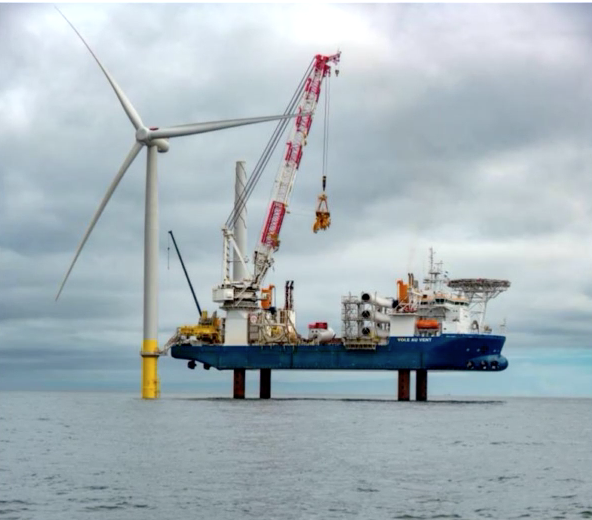Virginia state officials cautioned the Bureau of Ocean Energy Management that its proposed opening of 4 million acres off the Mid-Atlantic coast for wind energy development must include early steps to avoid conflicts with commercial fishing and navigation to the state’s ports.
Republican Gov. Glenn Youngkin’s top cabinet officials sent a June 27 letter to BOEM stating support for wind power, but urging that planning “balance the competing interests of all stakeholders.”
The letter notes a potential for “millions of dollars of negative impact to Virginia’s commercial fishing industries.”
“While supportive of the growth of the offshore wind industry and the opportunities for the commonwealth to provide critical support to the offshore wind industry supply chain and become a key hub for future development, we must ensure any future leasing areas do not detrimentally impact or restrict maritime commerce or commercial navigation,” the letter states.
Virginia is heavily invested in offshore wind with a goal of making the Norfolk and Hampton Roads ports a major hub for the U.S. wind industry. Under former Democratic governor Ralph Northam the state committed to offshore wind in its future energy planning.
Virginia-based Dominion Energy plans the biggest U.S. offshore wind project so far, the 2.6-gigawatt Coastal Virginia Offshore Wind project of 176 turbines. It will use Hampton Roads as its base of operations for the first U.S.-built wind turbine installation vessel.
While those plans progress, the Youngkin administration is communicating some reservations.
Youngkin was absent from a June 23 White House event promoting partnership on offshore wind planning with governors of states from Maine to North Carolina. Like those governors, the Biden administration is stressing how offshore wind development can benefit construction and maritime trade unions – an important political constituency in the Northeast.
That union preference brought a response back from the Youngkin administration. State officials told BOEM they are “focused on the economic development opportunities presented by this emerging sector in a way that is consistent with a common-sense energy policy that promotes jobs for Virginia and its right-to-work philosophy.”
Virginia recreational fisheries could benefit from wind turbine construction, creating new hard structure that attract fish, the letter notes. But the 4 million acre expanse proposed by BOEM for future leasing could risk “millions of dollars of negative impact to Virginia's commercial fishing industries.”
Survey work for wind projects has brought conflict with black sea bass and conch fishermen’s gear, and recent studies say the East Coast surf clam fleet could lose as much as 15 percent of its revenue if its vessels cannot work in wind turbine arrays.
“While supportive of the growth of the offshore wind industry and the opportunities for the Commonwealth to provide critical support to the offshore wind industry supply chain and become a key hub for future development, we must ensure any future leasing areas do not detrimentally impact or restrict maritime commerce or commercial navigation within the federal channels into the Chesapeake Bay, Hampton Roads, The Port of Virginia's facilities, Chesapeake Bay anchorages, the Atlantic Ocean shipping lanes and its port approaches as well as traditional and projected high-density maritime traffic routes,” the letter states.
“Doing this will ensure that the Commonwealth continues to be a leader in the offshore wind industry, and will ensure that any offshore wind development is part of a common sense energy policy that is economically beneficial to the Commonwealth and developed in a manner that maximizes job creation and investment in Virginia, as well as balancing the critical interests.”







